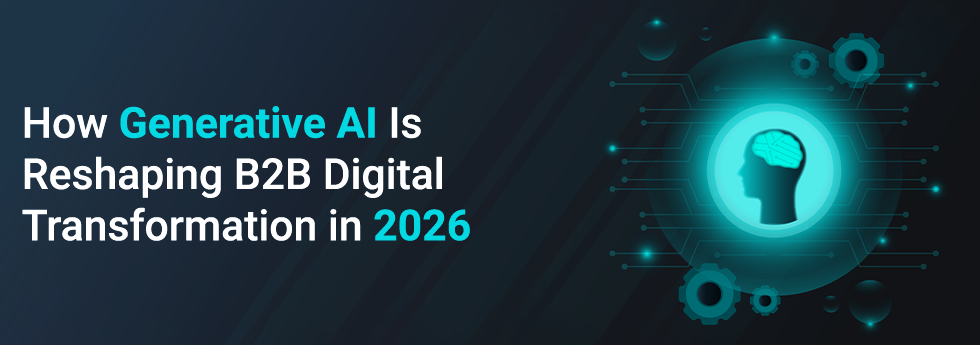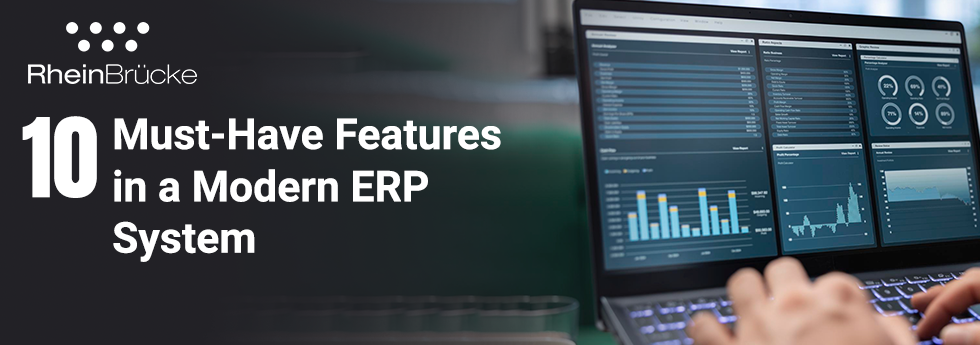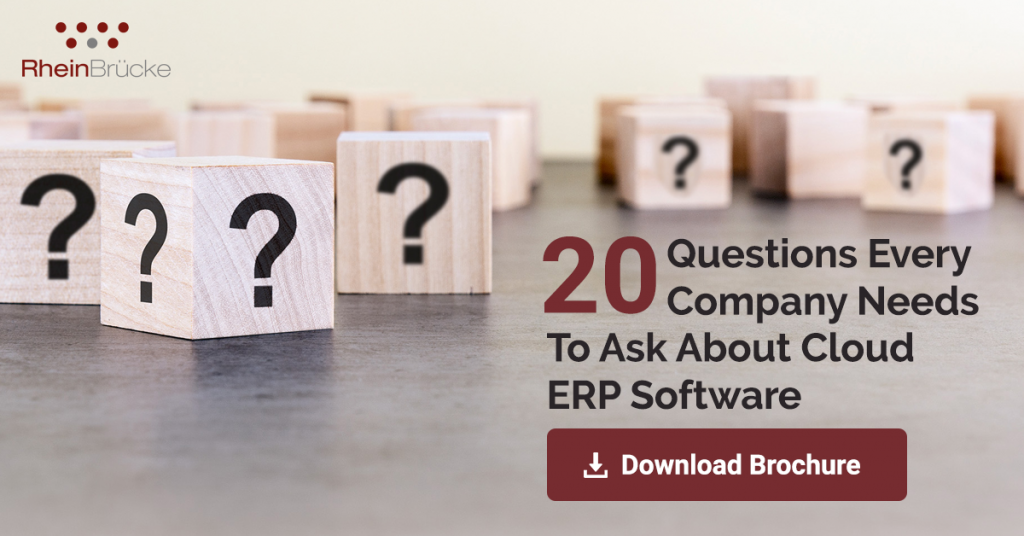
In this fast-evolving era, organizations are embracing change like never before to survive and thrive. Automating manual processes, cutting on usage of spreadsheets and opting for an ERP solution is now a necessity for every company. ERP stands for “Enterprise Resource Planning” and it refers to a system used by organizations to control and integrate important segments or functions of their businesses.
History of ERP dates back to 1960s when manufacturers started using software solutions for Materials Requirement Planning to manage, track and control their inventory, which then evolved to include more capabilities to handle manufacturing processes like scheduling and production processes too and became known as Manufacturing Resource Planning (MRP). It was in the 1990s true ERP systems that we see today came into use, that further expanded beyond the basic inventory control and manufacturing processes to include other departments and functions, such as accounting, finance, and sales. ERP systems have evolved so much from those basic systems and organizations across industries now leverage ERPs to integrate their business processes. But still, Manufacturers constitute the primary users of ERP. However, with an array of ERP vendors available today, how do you know which is the best ERP system for manufacturers today? One-size doesn’t fit all. When you are thinking of upgrading or switching to a new ERP for your manufacturing business, it is important to be aware of the many options available, the features offered by each and their areas of strength to determine which solution meets your business needs best.
In this blog, we bring to you the top ERPs for the Manufacturing Industry. This list is based on user reviews from review sites like Capterra, G2, Gartner Peer Insights, etc and analyst reports like Gartner Magic Quadrant, Gartner Critical Capabilities Report for Product Centric ERPs 2020, etc.
Understanding ERP for Manufacturers
In simple language, an enterprise resource planning system can be thought of as a binding mechanism that brings information on several computers and departments securely into one single place. By using the best ERP system, each business unit of the company will have its own system and relevant information from other functions will be accessible through one application and one network.
An ERP system helps companies to manage all their daily business activities such as manufacturing, services, procurement, accounting, supply chain management, risk management, finances, project management, and many other processes from a single platform.
Let’s discuss further on ERP for manufacturers, as there are plenty of benefits of using manufacturing ERP systems. Using ERP solutions, manufacturing companies can digitalize purchasing, finance, production, and many other departments of their enterprise. ERP systems have all the elements for production, shop floor control, and purchasing and provide systemized management and data analysis for financial and sales functions. They enable manufacturing organizations to optimize business functions and thrive in a competitive business environment with benefits like improved supply chain management, reduced inventory, shop floor flexibility, and better customer service. But choosing the right ERP is not easy for manufacturers today. It’s not just the vendor that has to be chosen, but also there is a choice of deployment options – Cloud, On-Prem or Hybrid. Read on to know about these deployment options and find out the best ERP vendors for Manufacturing Industry.
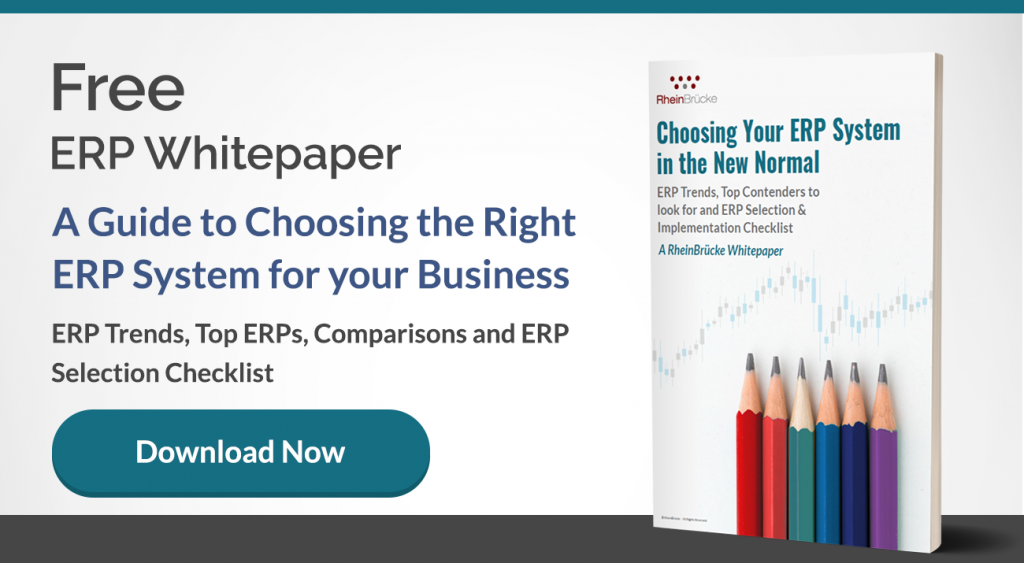
Benefits of using ERP for Manufacturing Industry
There are numerous advantages of using Enterprise Resource Planning software in manufacturing industries. Some of the key benefits are:
- Increased productivity achieved through streamlining and automation.
- Gain in-depth data and thus gain control over critical business processes like production control, BOM management, production scheduling and improve shop floor efficiency.
- Increase visibility and enhance performance in real time.
- Identify and manage risks proactively.
- Access to reports and dashboards for tracking and analysing your data and monitoring KPIs.
- Improved flexibility leads to business agility.
Deployment of ERP systems
On-Premise:
These are administered and maintained in a company managed data centre, organized on the enterprise’s own servers and computers, which will give complete control and freehold on the system after its implementation.
Cloud-based:
It is also known as Saas (Software as a Service). This type of ERP is offered and managed in the cloud, as opposed to the business hosting their system on premises. The data is cached and is accessible on a device with an internet connection. The company usually needs to buy subscription and periodic updates and support are provided by the software provider.
Functionality difference between On-Premise and Cloud – Click here
Hybrid:
A combination of cloud-based and on-site ERP software is known as a hybrid ERP solution – get the best of both worlds. These models provide more resilience to shift between models of delivery and provide improvements that are not available with solo implementation.
To know more about On-Premise, Cloud & Hybrid – Click here
According to the Gartner report (July 2020), business leaders are propounding over cloud-based ERP systems, that can be customized according to the customer-specific requirements. One of the key findings also stated, that there is a transition of ERP market towards cloud-based solutions, as they are easy to use and maintain.
What are the top ERP solutions for manufacturing industry available in the market?
After a thorough research, here is a list of the best manufacturing ERP systems in alphabetic order.
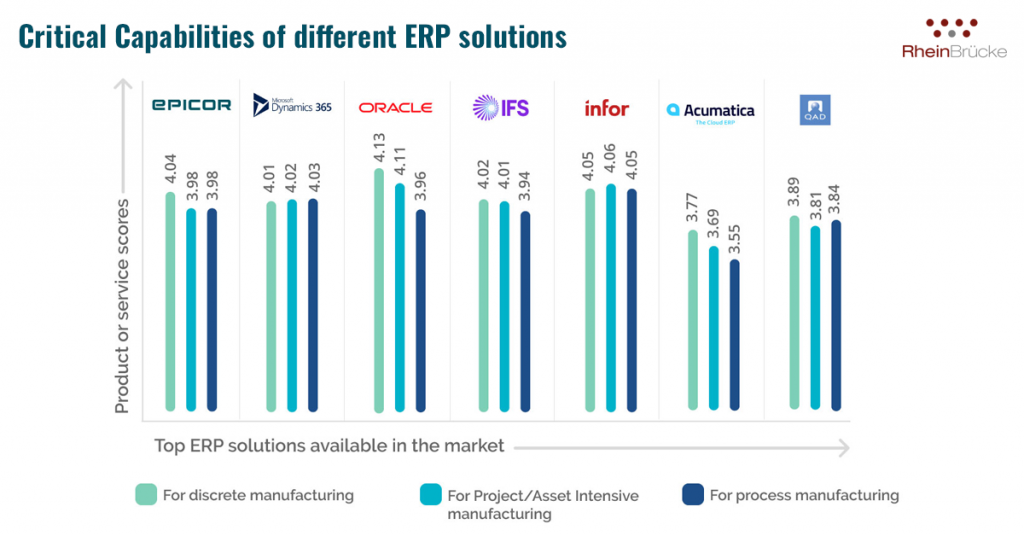
It is the fastest developing ERP solution, that is focused entirely on manufacturing. The software provisions to be used for small to mid-size organisations as a cloud-based ERP. Taking account of the Gartner report, Figure1.1 displays that Acumatica scored average for midsize enterprises and below the median for large and global enterprises. The ERP solution is extensively supported in majority of the countries and in multiple languages. The system is flexible, adaptable, and convenient for small to mid-scale organisations. The critical capabilities use case results suggest that it is a good fit for mid-size enterprises that require discrete manufacturing capabilities. Due to extensible cloud platform, it is suitable solution to accomplish core application gaps, which facilitates modern technology architecture use case.
An ERP solution that is robust, modular and provides end-to-end software solutions to the enterprises of all size. It has what it takes to reduce costs, improve customer responsiveness, establish business processes and acquire success and profitability. It is one of the best ERP systems for manufacturing industry and is especially suited for mid to large sized enterprises. The ERP solution can be purchased directly or indirectly through partner channels. It was designed and developed for both private and public clouds. The critical capabilities for manufacturing use case report (Figure 1.1) indicates that Epicor has scored average within manufacturing use cases and is a great choice for many businesses. It is one of the vendors which has received heavy weightage scores for asset-intensive manufacturing features and functions like PLM, CLM and complex BOM’s. The ERP solution has scored above average for process manufacturing and discrete functionalities. However, it has achieved median for modern technology architecture use case. The partnership with Microsoft Azure cloud platform has helped in establishing both private and public clouds. Through its own professional services and partners, Epicor supports numerous geographic regions and has growing support in APAC(Asia-Pacific) and EMEA.
IFS:
Industrial and Financial Systems (IFS) is a manufacturing software ERP which is useful for organizations that require extensive project management. Main functionalities include FSM (Field service management), ERP support and EAM (Enterprise asset management). The application can be used for several industries and focuses on midsize to large scale enterprises. The results achieved in the critical capabilities report are median for all the use cases. The application has a strong influence and customer base in Europe and is thereby useful for enterprises with greater EMEA presence. The customer survey reports suggest that, it has robust capabilities in handling global operations with multinational enterprises. The application is suitable for companies that require capabilities in asset management. As per the Gartner report, IFS ratings in the areas of advanced technology are average, mainly due to the factor that their cloud software offerings are relatively new.
Infor is a potent suite of ERP for manufacturing industries. Infor provides industry specific ERP suites for wholesale, manufacturing distribution and product-centric enterprises. Each CloudSuite is associated with different features to cater to the specific needs of the industry. The Infor CloudSuite application has approximately 500 customers according to reports. The study conducted by Gartner suggests that Infor CloudSuite ranks largely above average for most of the use cases (Figure 1.1). It has a good score for process manufacturing and discrete manufacturing verticals. One of the major drawbacks as per user reviews for the system is slow customer adoption. Infor is popular across North America, Asia/Pacific and Europe.
Microsoft Dynamics 365 is a good ERP for manufacturers. It allows various functionalities across number of operations within and beyond manufacturing. Microsoft Dynamics 365 and Microsoft Dynamics 365 supply chain management consists of a complete suite of ERP applications targeted at midsize and large enterprises. Structured on Microsoft Azure platform, Dynamics 365 is rich with capabilities like power apps, power BI and power automate. The added features include self-service reporting, robotic processing automation (RPA) and a low code / no code application platform for developers. The usage is across various industries, but its primary targets are manufacturing, retail, and distribution. The ERP solution is an excellent fit for greater and more complex organisations because of the ease of flexibility provided. The Gartner report score card implies, Dynamics attained above average on ERP functionalities for midsize enterprises, reflecting flexibility and scalability. Also, the manufacturing capabilities results are average to above average for large deployments.
The Oracle ERP cloud works as a SaaS (Software-as-a-service) platform. Business processes are streamlined, and data flow is easy between the users. The ERP solution provides operations for midsize, large, and global enterprises. Its main functionalities include project management, risk management, core finance and accounting, budgeting and planning, purchasing, supply chain management, manufacturing abilities and industry-specific applications. Data security and interconnectivity are its important features. The Gartner critical use case report suggests that Oracle ERP cloud has encapsulated great results for all the use cases. It gained above average for large and global deployments and above average for midsize enterprises. The application excels due to its great geographic coverage. It has one of the highest scores for modern technology architecture use cases. Oracle ERP cloud has a consistent next generation UX (Redwood), a persistent integration across HCM, stable finance and operational ERP competencies. To enhance its mobility and usability for context-sensitive data, Oracle is mainstreaming AI (Artificial intelligence) and machine learning functionalities. The Gartner report suggests that the ERP solution has scored above average for discrete and project/asset-intensive manufacturing. The application could be a great candidate for process manufacturers although customer survey reports suggest that some supply chain and manufacturing features are not as vigorous as other legacy features.
QAD:
QAD is a popular manufacturing ERP software solution, that is being predominantly used by automobile, consumer products, high tech, food and beverage, life sciences and chemical manufacturing organisations. The company has claimed to have provided cloud ERP solutions to more than 600 enterprises. The first product was released as QAD cloud ERP and has now been rebranded as QAD Adaptive ERP. QAD is found suitable by mid-size and larger North American customers. However, it is found unsuitable by those looking for broad HCM functionality or other specific industrial requirements. As seen in the Gartner report (Figure 1.1), this ERP solution gained reasonable or below the average score for different use cases in critical capabilities research. Analysis on the solution reported that it lacks estimations and analytics. For more than ten years, the company has been working as a cloud-based solution and provides easy customization standards to its users.

Conclusion
The year 2021, has brought crucial challenges for each industrial sector. Especially the manufacturing industry is facing issues related to fluctuations in demand, workforce challenges related to employee health & safety and supply chain disruptions. . To overcome these challenges, an ERP solution is the most needed requirement in this domain. The best fit ERP for your business depends on several factors – the size of the business, manufacturing process, geographical presence, budget, and so on. All the vendors listed here have strong features for modern manufacturers. Oracle ERP cloud is best suited for large organizations, whereas Epicor, Infor, IFS, Microsoft Dynamics 365, and QAD help in achieving significant milestones for mid-size to large enterprises. Acumatica is a potential candidate for smaller businesses.
If you still require help in finding the best ERP software for your organization, our experts can help you shortlist the best software options for your organization’s unique needs. Contacts us.

